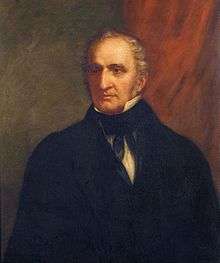Tristam Burges
| Tristam Burges | |
|---|---|
 Tristam Burges painted by Charles Bird King | |
| Member of the U.S. House of Representatives from Rhode Island's At-large district | |
|
In office March 4, 1825 – March 3, 1835 | |
| Preceded by | Samuel Eddy |
| Succeeded by | William Sprague III |
| Member of the Rhode Island General Assembly | |
|
In office 1811 | |
| Personal details | |
| Born |
February 26, 1770 Rochester, Massachusetts |
| Died |
October 13, 1853 (aged 83) East Providence, Rhode Island |
| Resting place | North Burial Ground |
| Political party |
Federalist Party Whig |
| Residence | East Providence, Rhode Island |
| Alma mater | Brown University |
| Occupation | Lawyer |
Tristam Burges (February 26, 1770 – October 13, 1853) was a U.S. Representative from Rhode Island, and great-great-uncle of Theodore Francis Green.
Early life and law career
Burges was born in Rochester, Massachusetts February 26, 1770 to John and Abigail Burges. Burges' father was a cooper and farmer, and a Revolutionary War veteran.[1]
Burges attended the common schools. He studied medicine at a school in Wrentham. Upon the death of his father he abandoned the study of medicine. He was graduated from Rhode Island College (now Brown University), Providence, Rhode Island, valedictorian of the class of 1796.[1][2] He studied law, and was admitted to the bar in 1799[1] and commenced practice in Providence, Rhode Island.[2]
He married in 1801 to a daughter of Hon. Welcome Arnold, and had several children.[1]
Political career
He served as member of the Rhode Island General Assembly in 1811 and a prominent member of the Federalist Party.[1] He was appointed chief justice of the supreme court of Rhode Island in May 1815, serving for just one year.[1]
In 1815 Burges was named as professor of oratory and belles letters at Brown University; he taught lectures in rhetoric and oratory.[1] He was dismissed from this position in 1830.[3]
Burges was elected to the US Congress in 1825 as a Federalist and served for ten years. He was known for his witty repartee with Anti-New England Virginian John Randolph.[1] He favored a protective trade tariff, and he lost re-electing because he refused to accept a tariff compromise proposed by Henry Clay.[1]
Burges was elected as an Adams candidate to the Nineteenth and Twentieth Congresses and elected as an Anti-Jacksonian to the Twenty-first through the Twenty-third Congresses (March 4, 1825 – March 3, 1835).[2] He served as chairman of the Committee on Revolutionary Pensions (Nineteenth Congress), Committee on Military Pensions (Nineteenth and Twentieth Congresses), Committee on Revolutionary Claims (Twenty-first Congress), Committee on Invalid Pensions (Twenty-second and Twenty-third Congresses). He was an unsuccessful candidate for reelection.[2]
After an unsuccessful run for Rhode Island Governor as a Whig party candidate in 1836, he resumed the practice of law[2] in East Providence, Rhode Island.[1]
He died on his estate, "Watchemoket Farm" (now a part of East Providence, Rhode Island), October 13, 1853, and was interred in North Burial Ground, Providence, Rhode Island.[2]
Sources
- 1 2 3 4 5 6 7 8 9 10 Munro, Wilfred Harold (1916). Memorial Encyclopedia of the State of Rhode Island. New York, Boston, Chicago: American Historical Society.
- 1 2 3 4 5 6 "BURGES, Tristam". Biographical Directory of the United States Congress. United States Congress. Retrieved 23 January 2016.
- ↑ Mitchell, Margaret (1993). Encyclopedia Brunoniana. Brown University Library. Retrieved 22 March 2015.
- United States Congress. "Tristam Burges (id: B001082)". Biographical Directory of the United States Congress.
External links
![]() This article incorporates public domain material from the Biographical Directory of the United States Congress website http://bioguide.congress.gov.
This article incorporates public domain material from the Biographical Directory of the United States Congress website http://bioguide.congress.gov.
| United States House of Representatives | ||
|---|---|---|
| Preceded by Samuel Eddy |
Member of the U.S. House of Representatives from Rhode Island's at-large congressional district March 4, 1825 – March 3, 1835 |
Succeeded by William Sprague III |